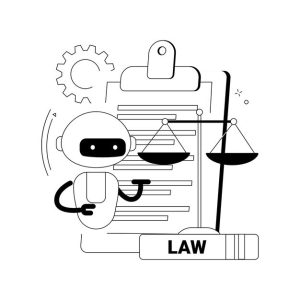Introduction
Legal professionals have operated since ancient times as societal bases which maintain justice and help settle disagreements and construct legal frameworks. Since Ancient Greece until today legal experts have undergone unprecedented changes in their profession as they transition from philosopher-lawyers to contemporary attorneys who handle modern legal systems. The current digital world has transformed the legal field through artificial intelligence (AI) advancements which deliver enhanced legal service management to clients. This research investigates lawyer development through time alongside modern difficulties then examines how AI-driven law assistants redefine legal practice.
The Legal Profession: A Historical Perspective
The roots of lawyering stretch into ancient societies when legal institutions employed their representatives to defend clients before basic judicial systems. Through time the legal industry transformed its practices to align with common society developments while laws became more complex.

Key Milestones in Legal History
- Ancient Greece and Rome – The legal advocacy methodology developed during ancient Greece alongside Rome because Socrates and Cicero instigated foundations for how to argue in courts and construct legal defense methods. During the period of Rome the justice system heavily relied on orators whose expertise involved representing clients while influencing legal outcomes.
- Medieval Legal Guilds –During the medieval era the first legal organizations known as guilds started to appear due to increasing legal system organization. At this period professionals specialized in legal education as part of their professional development.
- The Establishment of Law Schools – Establishments of law schools became necessary in the 19th and 20th centuries to create standardized legal expertise with ethical practices.
The Trial of Socrates: A Landmark Case
One of the most famous trials in history, the trial of Socrates in 399 B.C., highlights the complexities of legal interpretation. During the political turmoil of his time Socrates faced accusations of impiety and youth corruption which were reflections of the controlling climate. The legal world continues to carry forward his case as a vital teaching about fair justice and ethical conduct for legal practices throughout the centuries.
The Modern Lawyer: Challenges and Demands

Owing to legal system complications lawyers face excessive workloads along with responsibilities to deliver specialized advice while maintaining competency regarding expanding laws. Lawyers specialized their practice to focus on separate legal fields including:
Corporate Lawyers – Handling business transactions, mergers, acquisitions, and corporate governance.
Criminal Defense Lawyers – Defending criminal defendants is a key aspect of Criminal Defense Lawyers who provide legal representation at criminal trials.
Civil Lawyers – Civil Lawyers resolve different legal matters including family disputes and labor problems in addition to real estate disagreements.
Patent Attorneys – Lawyers specialized in patents safeguard property rights and prep and file applications for protection.
The Rising Costs of Legal Services
Professional legal aid remains unaffordable for numerous individuals and small business owners because prices within the industry have experienced significant growth during recent times. The legal consultation market offers hourly rates which fall between $250 and $350 per hour according to information gathered by Contracts Counsel across different specialty areas. The expensive legal fees create an access to justice problem because poor people lack enough funds to secure proper legal assistance.
The Role of AI in Legal Assistance

Widespread adoption of artificial intelligence revolutionizes legal employees’ methods of working while enhancing client avenues for legal service access. Law offices now benefit from artificial intelligence systems that produce efficient legal work as well as economical and accessible legal solutions.
How AI is Revolutionizing Legal Assistance
Automating Document Review – A.I. performs document review at lightning speed through which it analyzes contracts and case files and legal documents accuracy for instant improvements in data accuracy together with massive reductions of manual tasks.
Legal Research & Case Analysis – AI systems scan extensive legal databases via their tools to retrieve suitable legal precedents which reduces lawyer research hours.
Virtual Legal Consultations – Virtual Legal Consultations enable consumers to get initial legal advice through AI-equipped chatbots which let them understand their options without requiring immediate face-to-face sessions.
Predictive Analytics – AI algorithms using predictive analytics use historical case outcomes to assist lawyers by supporting their court procedure strategizing.
E-Discovery and Compliance Monitoring – AI technology enables better digital record analysis which enables businesses and legal professionals to detect compliance risks.
Benefits of AI-Powered Legal Assistants
- Increased Efficiency – The automated process of routine legal work through AI makes it possible for lawyers to concentrate their expertise on intricate case work and important choices.
- Cost Reduction – AI technology reduces operational expenses and client fees through automated process operations.
- Improved Accessibility – Through AI-powered legal assistance more individuals can now secure basic legal support thus serving underserved population groups better.
- Minimized Human Error – The exactness of AI systems when analyzing enormous data quantities helps minimize human errors in legal documents alongside research work.
The Evolution of Legal Assistance: Past, Present, and Future
The Past – During ancient times lawyers functioned as recommendation and arbitration specialists who communicated through spoken arguments while using restricted documentation. During that time only wealthy individuals could access law practice while legal help remained limited to a few.
The Recent Past – Lawyers during the recent time period encountered mounting work pressure because advancing legal frameworks made basic legal services unaffordable to regular citizens.
The Present and Future – AI-based legal assistants are reshaping the sector to deliver affordable accessible professional legal advice along with increased efficiency for the present and upcoming era. The use of AI technology in the legal sector does not intend to replace human lawyers but enhances their operations by shifting repetitive workloads toward strategic and advocacy activities.
Ethical Considerations and Limitations of AI in Law
The advantages of AI come with ethical issues that demand solutions as well as operational constraints that need resolution.
Lack of Human Judgment – AI systems lack the emotional understanding as well as ethical decision-making skills and sophisticated judgment which human attorneys use for intricate legal matters.
Data Privacy and Security – Security measures need to be implemented to protect sensitive legal data because AI systems must prevent unauthorized breaches of data privacy regulations.
Bias in AI Algorithms – Allied Intelligence System AI systems need to achieve fairness as an essential requirement.
Regulatory and Compliance Issues – Before offering legal advice through AI technology professionals must ensure compliance with governing laws and ethical standards since this prevents deceptive information and potential legal risks.
Conclusion
Thus the legal field has achieved tremendous growth since ancient times holding philosophical debates while advancing to utilize AI-based digital systems in current times. The advancements in technology now affect how attorneys perform their work yet fundamental legal experience continues to bring essential value to legal practice. AI-powered legal assistants provide relief to lawyer workloads while bringing legal help into reach of more people who can now access it at affordable prices. The ongoing acceptance of AI by the legal field will lead to an efficient legal system that serves everyone with fairness and inclusiveness.
The application of AI technology in the law department produces both a progressive advancement and a complete revolution in the way the judicial system functions and reaches its recipients. The quest for achieving appropriate tech-in-law integration requires maintaining optimal relationships between automated systems and human practitioners to maintain modern-day legal justice.









